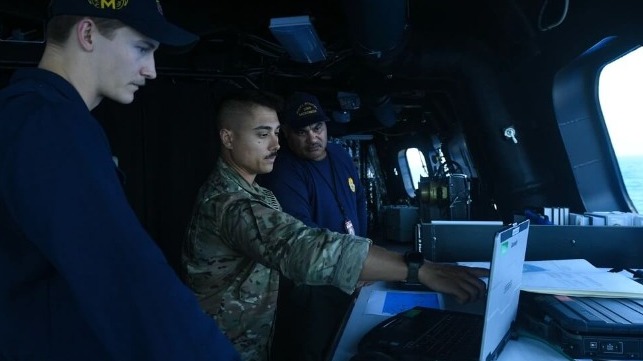U.S. Navy LCS Helps Micronesian Police Officer Enforce Local Law

The littoral combat ship USS Mobile and her joint U.S. Navy / U.S. Coast Guard crew are helping a local fisheries officer in the Federated States of Micronesia to enforce his nation's maritime laws.
Micronesian liaison Perry Tewasmal, a maritime police lieutenant from Pohnpei, boarded the USS Mobile on her arrival and helped direct the warship's counter-illegal fishing patrol in the Micronesian EEZ.
“Tewasmal provided the legal jurisdiction to operate within these waters,” said Coast Guard Lt. Kyle Swanney, officer in charge of the USCG law enforcement detachment boarding team on USS Mobile. “He was my subject matter expert in the area, and I was his conduit to operations as a deployable [law enforcement detachment] through a Navy asset.”
“We provided him with extra tools, like transportation, extra hands and eyes to do his job,” said Coast Guard Lt. j.g. Jared Mihalcik, Swanney's assistant officer in charge. “During [the Oceania Maritime Security Initiative], we are there to assist in his job as an authorized officer and he has a whole team of people available to help accomplish whatever he needs to.”

that matters most
Get the latest maritime news delivered to your inbox daily.
On March 20, USS Mobile got under way from the U.S. West Coast with an embarked USCG law enforcement team on the first deployment of the new Oceania Maritime Security Initiative (OMSI). Its objective is to reduce IUU fishing, combat transnational crime, and enhance regional security in the islands of the Western Pacific.
The U.S. government is putting a new premium on Pacific island partnerships to offset growing Chinese influence, and counter-IUU fishing assistance is a way to enhance America's reputation as a partner of choice. Small Pacific Island states do not always have the resources to police their expansive EEZs, and the U.S. is one of the few foreign partners capable of assisting in the task. The LCS platform has been used successfully to support Coast Guard boarding teams in the Caribbean and Eastern Pacific drug transit zones, and the model is being trialed for overseas fisheries enforcement as well.
